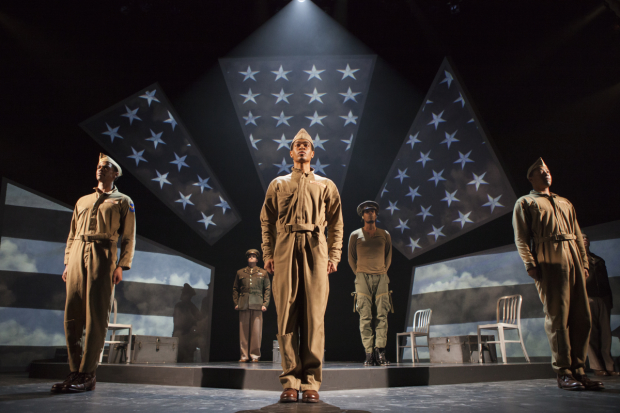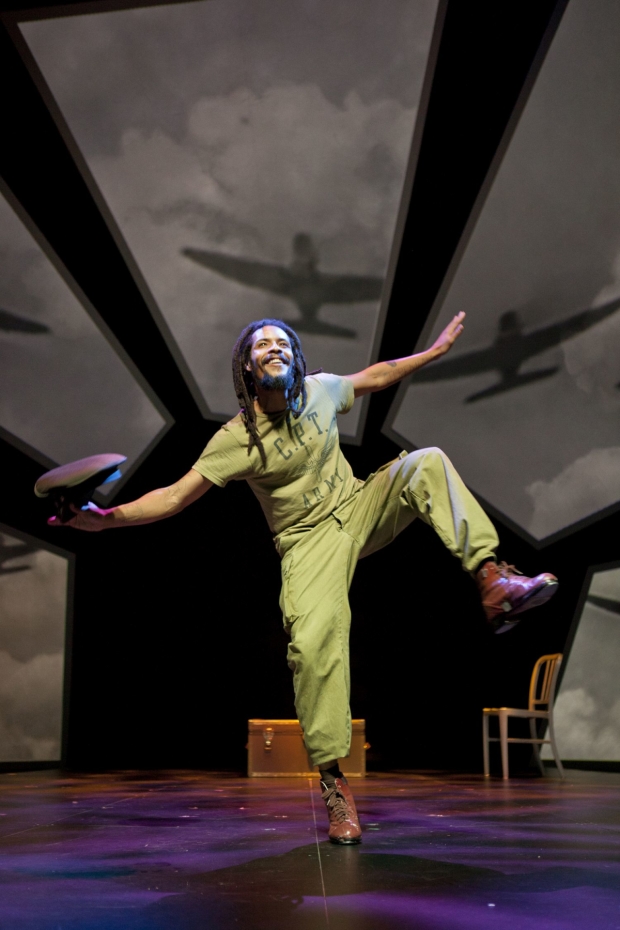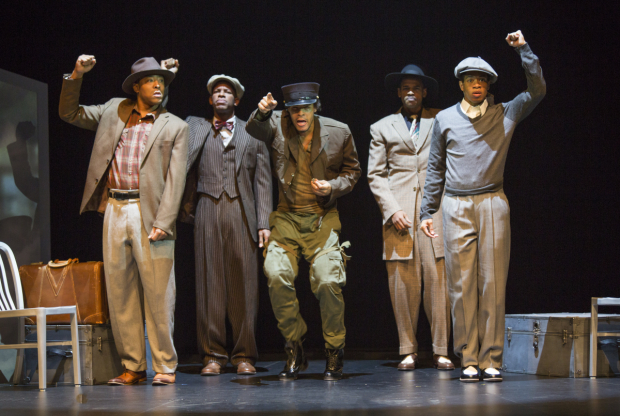Fly

(© Jim Cox Photography)
In the history of the American military, the Tuskegee Airmen occupy a pivotal and historic place, yet fewer people know about them than you'd expect. The multimedia, dance-infused Fly, a Pasadena Playhouse/Crossroad's Theatre Company production now running at the New Victory Theater, helps fill in that knowledge gap with an original, high-energy dramatization of several pilots' experiences as they fight wartime and racial battles on the ground and in the air. The story of the Tuskegee Airmen has been told before, but never quite like this.
Until 1940, African-Americans were not allowed to serve in the U.S. Army Air Corps, but Franklin D. Roosevelt changed that. He could not, however, change the attitudes of the white officers who were assigned to train the military's first black pilots. Subjected to racial bigotry and doubts about their intellectual ability to fly a plane, the Tuskegee cadets had to prove time and again that they were the equal of their white counterparts — and they did.

(© Sherry Rubel)
Fly takes a look at four Tuskegee Airmen and the challenges they faced. There's the swaggering W.W. (Brooks Brantly), the "no-nonsense race man" Oscar (Terrell Wheeler), the intellectual Bahamian J. Allen (Damian Thompson), and the young, bashful Chet (Desmond Newson). All of them have to endure the condescension of the white, foulmouthed Capt. O'Hurley (Anthony J. Goes), who pits the men against one another in a determined effort to see them fail. Not all the men make it, but when those who remain are sent into combat duty over North Africa in the 99th Fighter Squadron, they more than prove their mettle and expertise in combat.
Director and coauthor Ricardo Khan, who wrote Fly with Trey Ellis, has a unique vision for dramatizing the history of the men of the 99th. The show uses some eye-popping special effects to simulate the experience of flying. Beowulf Boritt's foreshortened scenic design and Clint Allen's fast-moving projections let the audience soar into the sky during training flights and action-packed dogfights. Rui Rita's stunning lighting and John Gromada's explosive sounds simulate the terror of bombs exploding in midair as the Airmen make history in the sky.

(© Jim Cox Photography)
The performances here are top-notch. Brantly and Wheeler give their characters affable brio and panache, Thompson portrays J. Allen with British-accented haughtiness, and Newson gives Chet the air of an innocent eager to prove himself. And as the racist O'Hurley, Goes raises some hackles. But Fly really stands out as ingenious theater because of Omar Edwards, the Tap Griot, who translates the Airmen's struggles and emotions into the language of dance. His expressive tapping reveals the men's inner conflicts and triumphs in a way that words cannot.
Khan occasionally lightens the play's serious side with comical scenes, such as when two Airmen teach a couple of white pilots (Ross Cowan and Brandon Nagle) an unorthodox way to overcome their fear of an impending mission. Amid laughter, racial differences are set aside as the men unite in spontaneous brotherhood.
Though the New Victory often stages works for young audiences, Fly is better suited to older kids and adults. The language sometimes turns vulgar and offensive (Capt. O'Hurly uses the N-word once), and some of the men's banter contains mature themes. That said, tweens and teens (as well as adults) will find the show entertaining and enlightening. Above all, Fly stands as an inspiring testament to a remarkable group of men who held their ground in the face of mindless bigotry, yet fought bravely and in some cases gave their lives for a country that did not deserve them.










